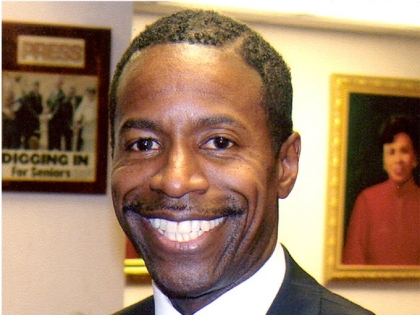
Opening Statement Quick Start Report
Malcolm A. Smith
November 12, 2008
QUICK START MEETING
NOVEMBER 13, 2008
INTRODUCTION
On behalf of the Senate Democratic Conference, I wish to express my appreciation for the opportunity to participate in this second Quick Start Conference, which hold the promise of an on-time 2009-10 State budget. The Budget Reform Act enacted in 2007 was crafted to help create a process that is more transparent and which further the chances of an on-time budget. We certainly support these goals.
ECONOMICS
Our estimates of both the State and national economic indicators do not differ appreciably from those of the Executive, and we all agree that all the indicators clearly attest to a rather bleak picture of the economy. We also recognize that the current economic climate is extremely volatile and difficult to predict. We are deeply concerned about the length and breadth of the national housing crisis, the banking and financial sector credit and liquidity crisis, the increasingly bleak employment picture, and the nearly 40% decline in the equity markets this year. There is no doubt that the economy is in recession. One of the basic assumptions used in our Quick Start Report is that three of the fundamental economic indicators – namely US Gross Domestic Product (GDP), US and NY employment, and personal consumption have either started to decline (for example, US employment started declining in January 2008) or are projected to decline beginning in this quarter for at least another three consecutive quarters. This contrast with the last four US recessions both in term of length and breadth.
Economic Indicator Differences
Compared with DOB projections on a calendar year (CY) basis, the differences between our report and DOB Mid Year Report reside in the fact that for CY 2008, we project slightly lower NYS wage growth (1.3% vs. 1.5%) and slightly lower personal income growth (2.5% vs. 2.7%). This also holds for CY 2009, where we project slightly lower NY wages (2.1% vs. 2.3%) and slightly lower personal income growth (1.0% vs. 1.2%).
Similarly for the national economy, our projections are slightly lower than the Executive’s. Both our US GDP and personal income growths are less than DOB with (1.3% vs. 1.4%) and (4.3% vs. 4.4%) respectively. For CY 2009, we project that Real US GDP will actually decline 0.2% (instead of 0.1%) while US personal income is expected to grow 1.8% instead of 2.0%.
Given the strong correlation of wages to personal income tax receipts, it is quite evident that further write-downs on Wall Street can only exacerbate the downward pressure on wages and employment.
Wall Street Bonuses Differences
Our Report projects a slightly greater reduction in Wall Street bonuses for both 2008 and 2009. For 2008, we project a 48% reduction in bonuses compared to 43% for DOB; for 2009, these numbers are 25% and 21% respectively. At this juncture, everyone seems to agree that the high levels of Wall Street year-end bonus payments of the last two years (approximately $33 billion per year) may unfortunately not be experienced in a near term.
Thankfully, New York State’s overall real estate market, did not collapse despite of signs of weakness with lower sales totals and reduced median sale prices. Also, the Tourism Industry has experienced another banner year in the New York City area with hotel occupancy and average price per room remaining rather strong.
US INTERVENTION MEASURES
Over the last month of the Summer, the Federal Government had to intervene in the market with unprecedented measures, and is still considering further actions. The Fannie Mae and Freddie Mac bailouts, the de facto nationalization of the insurance giant AIG, and the rescue of Bear Stearns all have been attempts to stabilize the banking, housing, and financial sectors. By some accounts, all these measures will cost the US taxpayers at least $1.8 trillion which is expected to well exceed $2.0 trillion. To provide additional relief, the Federal Reserve Bank had to lower its Funds rate to 1.00% leaving very little margin to fight inflation in the future. These actions, particularly the stimulus package enacted last April is credited for increasing personal consumption by almost 2% across the nation, and Congress is contemplating another stimulus package.
STATE TAX REVENUES
In general, our predictions of State tax receipts do not variably differ from those of the Executive, and we both agree that the current economic situation of the State is bleak. In fact, since the March 1st 2008 Revenue Consensus letter was issued, State Personal Income Tax revenue projections have been reduced four times. It is clear that beginning in SFY 2009-10, the "golden era’ of strong corporate sector tax and personal income tax growths and unprecedented Wall Street bonuses is over.
In our 2008 Quick Start report, we predict slightly lower General and All Funds Personal Income and Sales tax receipts for the remainder of SFY 2008-09 and for SFY 2009-10 compared to the Executive’s Mid-Year forecast. Considering the size and scale of receipts, these estimates are statistically equivalent to those provided by the Division of the Budget.
Personal Income Taxes
We expect Personal Income Taxes receipts to decline next year although both withholding and estimated payments to date remain rather strong.
For 2008-09, our closeouts of both General Fund and All Funds personal income tax receipts are smaller than DOB’s projections. We expect General Fund and All Funds personal income receipts closeouts of $141 million and $227 million less than DOB respectively.
For SFY 2009-10, we project smaller PIT General Fund revenues ($171 million less), and smaller All Funds receipts ($262 million) compared to DOB.
Corporate Taxes
Much smaller profit margins and the national credit and liquidity crisis in the corporate sector are primarily responsible for dramatically smaller corporate tax receipts than projected just a year ago. Furthermore, NY corporate audit results are appreciably smaller than those collected in the two previous fiscal years.
Our projections for Corporate Taxes are the same as DOB. However, we also assert that business State revenues, particularly in the Bank Tax category, are extremely volatile, and we should note that DOB’s predictions have been reduced considerably since the Enacted Budget.
Sales Tax and User Fees
Continuing downward pressure on New York wages, personal income, and employment growth undermine Sales Tax growth and receipts. Unfortunately, it is not expected that the 2008 holiday season sales will bring relief to retailers.
Compared to DOB, we expect slightly decreased Sales and selected User Tax revenues over the next 18 months. For SFY 2008-09, we project General Fund receipts closeouts of $50 million less than projected by DOB. For SFY 2009-10, we forecast a General Fund Sales tax receipts of $48 million less than the Executive.
This report agrees with DOB projections for the 2010-11 State Fiscal Year.
Other Taxes
Our 2008 Quick Start Report agrees with DOB assessments.
SFY 2010-11 Total Receipts
We agree with the Executive's projections regarding all SFY 2010-11 receipts.
DISBURSEMENTS:
:Our Quick Start Mid-Year Report concurs with all disbursement and caseload projections provided by the Division of the Budget for the years under consideration, and we also acknowledge that as the economy worsens, caseload activity for the major spending areas – especially Medicaid - will increase considerably. However, we believe that DOB’s disbursement projections correctly reflect these trends.
:CONCLUSION:
:To summarize, we hope that this Quick Start process will help realize an on-time budget next year and we applaud the Governor for planning to submit next year’s Executive Budget much sooner. New York State is unquestionably facing economic challenges rarely seen in its history. We understand that all parties involved recognize the gravity of the situation. As we all know, the path to an on time budget that does not decimate existing vital programs is a difficult one. As we work towards an on time budget, we look forward to directly engaging with all parties with the hope that our collective effort will produce a State Budget that addresses its profound structural imbalances while preserving vital services and promoting economic growth. New York State Senate Democrats have long argued that a more transparent budget process leads to a better enacted budget and also to greater public confidence in our political institutions and the entire budget process itself.
Thanks again for the opportunity to participate in this Quick Start public meeting.
CLICK HERE TO VIEW THE FULL REPORT
Share this Article or Press Release
Newsroom
Go to Newsroom9/11 Statement From Senator Malcolm A. Smith
September 11, 2011
SENATOR MALCOLM A. SMITH 6TH ANNUAL FAMILY DAY, SEPTEMBER 10, 2011
September 2, 2011
